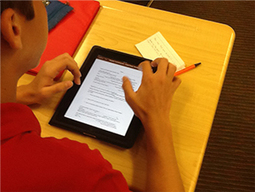MOOC = Massive Open Online Course
"This space will act as an information hub for #etmooc, an open, online experience that is designed to facilitate & nurture conversations around the thoughtful integration of educational technology & media in teaching and learning.
Think of #etmooc as an experience situated somewhere between a course and a community. While there will be scheduled webinars and information shared each week, we know that there is a lot more that we will collectively need to do if we want to create a truly collaborative and passionate community.
We’re aiming to carry on those important conversations in many different spaces – through the use of social networks, collaborative tools, shared hashtags, and in personalized spaces. What #etmooc eventually becomes, and what it will mean to you, will depend upon the ways in which you participate and the participation and activities of all of its members. Let’s see if we can create something that is not just another hashtag – and, not just another course.
Some exciting topics will be explored during the #etmooc experience. We’ll be leading conversations around many of the recently popularized technologies, media and literacies including social/participatory media, blended/online learning environments, digital literacies, open education, digital citizenship/identity, copyright/copyleft, and multimedia in education. We hope that this list of topics will grow as we expand our membership and tap into the expertise of our participants. However it is not the topics that we cover, but it is what we discover, create and share together that will be critical to the success of the etmooc experience."
"Topics & Tentative Schedule
The 2013 tentative schedule of topics is found below. More detailed information will be provided soon, including exact dates and connection information. Each topic is 2 weeks long so that there is adequate attention and depth.
Welcome (Jan 13-19): Welcome Event & Orientation to #etmooc
- Topic 1 (Jan 20-Feb. 2): Connected Learning – Tools, Processes & Pedagogy
- Topic 2 (Feb 3-16): Digital Storytelling – Multimedia, Remixes & Mashups
- Topic 3 (Feb 17-Mar 2): Digital Literacy – Information, Memes & Attention
- Topic 4 (Mar 3-16): Digital Citizenship – Identity, Footprint, & Social Activism
- Topic 5 (Mar 17-30): The Open Movement – Open Access, OERs & Future of Ed."
Via
Dennis Richards



 Your new post is loading...
Your new post is loading...














